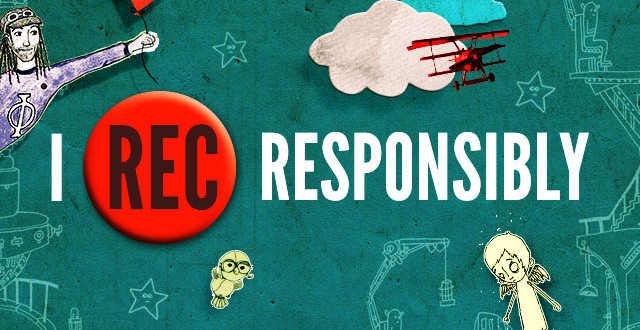
When Participant Productions launched Pivot (http://www.pivot.tv/), its partly-crowdsourced TV channel, it turned to the Center for Media and Social Impact to create its guide to good copyright behavior. CMSi, with the help of the Washington College of Law’s Prof. Peter Jaszi, developed a pledge–which anyone can take (and share with students, friends and family, hint hint).
I REC Responsibly explains:
You’re a creator—that’s awesome; the world needs more people like you. Content shared can change minds and change hearts in positive, inspirational, and sometimes humorous ways. As you imagine, create, and share your work, it’s important to know your rights, the rights of others, and your reach.
Whether online or not, almost all content today—once it is in tangible form—is protected under copyright law, regardless of whether or not the copyright symbol is on the page or someone says “all rights reserved.”
Sometimes, however, you have the right to reuse existing material. Words like “fair use,” “public domain,” and Creative Commons come up often when repurposing existing content into something new. They help you and other content creators have more access to work without impairing copyright owners’ rights—yours or others’.
Claiming fair use allows you to use copyrighted work when you are adding value to the original—using it for a transformative purpose and using the amount appropriate for that new purpose. Such purposes can include commentary, criticism, illustration, reporting, collage, and parody, among others.
The public domain consists of material that has never been or is no longer protected by copyright, usually because of its age.
Finally, more and more material is available under Creative Commons licenses that allow you to use it under certain conditions.
Repurposing and reusing existing work is a fundamental part of making new culture. Your content can also be a boon when others remix, share, or comment on your art. Although giving credit is not usually required under copyright law, it is basic etiquette and always a good idea—online or offline. Other creators really appreciate your recognition of their work.
Commit to creating responsibly: Know your rights, the rights of others, and how your content will be distributed.
The pledge says:
I pledge to:
- Go forth and create responsibly!
- Read the Documentary Filmmakers’ Statement of Best Practices in Fair Use and the Code of Best Practices in Fair Use for Online Video and understand when and how I can creatively use existing content.
- Learn when different kinds of work fall into the public domain.
- Look into Creative Commons licensing of content.
- Know that online my content, even if I delete it, may be used, reposted, and repurposed by others.
- Give credit where credit is due.
Feel free to spread the news….and the pledge!
